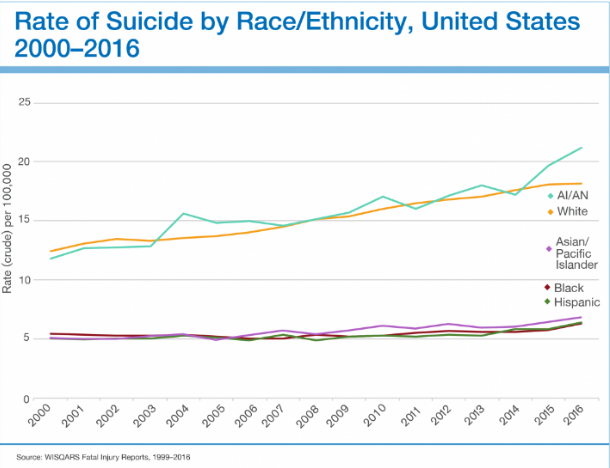September 9-15 is National Suicide Prevention Week. This time should be used to share resources and stories in an effort to shed light on the struggles that many people face day in and day out. It should also be a time to ensure that your family and friends have the resources and help they need.
Statistics
Suicide is the 10th leading cause of death in the United States. Each year, over 44,000 Americans die by suicide. For every one suicide death, there are 25 attempts made across the country.

Source: Suicide Prevention Resource Center
Suicide rates vary by race and ethnicity. In 2016, the rate of suicide among American Indians/Alaska Natives was 21.39 per 100,000 and among Caucasians it was 18.15. In contrast, the suicide rate among Asian/Pacific Islanders was 7.00; the rate for African Americans was 6.35; and the rate among Hispanics was 6.38.
White males accounted for 7 out of 10 suicides in 2016, and the rate of suicide is highest in middle age.
Ways to Spot the Signs
It is important to note that suicide itself is not a mental illness. It is, however, a serious potential consequence of treatable mental disorders that include major depression, bipolar disorder, post-traumatic stress disorder, borderline personality disorder, schizophrenia, substance use disorders, and anxiety disorders like bulimia and anorexia nervosa.
Any of the following could be potential warning signs or triggers for suicidal thoughts or actions:
- Excessive sadness or moodiness including unexpected rage.
- Feeling a deep sense of hopelessness about the future, with little hope or expectations for conditions to improve.
- Sleep problems.
- Sudden calmness. Suddenly becoming calm after a period of depression or moodiness could be a sign that the person has made a decision to end his or her life.
- Choosing to be alone or avoiding social activities, especially if the individual once enjoyed those outings.
- Changes in personality or appearance, such as as speaking or moving with unusual speed or slowness or caring less about appearances.
- Dangerous or self-harmful behavior such as reckless driving, engaging in unsafe sex, and increased use of drugs and/or alcohol.
- Recent trauma or life crisis including the death of a loved one or pet, divorce or break-up of a relationship, diagnosis of a major illness, loss of a job or serious financial problems.
- Making preparations such as visiting friends and family members, giving away personal possessions, making a will, and cleaning up his or her room or home.
- Approximately 50-75% of people considering suicide will give someone, usually a loved one, a threat of suicide. However, not everyone considering suicide will say so, and some may threaten suicide and not follow through. Every threat of suicide should be taken seriously.
How to Support Someone
People who receive love and support from family and friends and who have access to mental health services are less likely to act on their suicidal impulses than are those who are socially isolated. If you believe someone you know may be suicidal:
- Don’t be afraid to ask them if they are having suicidal thoughts.
- Ask if they are taking their medications and/or seeing a therapist.
- Instead of trying to talk them out of suicide, remind them that depression is treatable.
- In some cases, a person just needs to know that they are cared for. Let them talk about their feelings, and encourage them to seek professional help.
Resources
If you are having suicidal thoughts, help is available.
Community Access Network
Our on staff counselors are always available to talk, with no appointment necessary.
If you are struggling with overcoming substance abuse, the Central Virginia Hope Initiative is able to help. Anyone who drops in has the opportunity to surrender their drugs, alcohol or paraphernalia with no consequence to them.
Suicide Prevention Hotline:
- National Suicide Prevention Hotline– 1-800-273-8255
- For Spanish speakers- 1-888-628-9454
- If you are hard of hearing, you can chat with a Lifeline counselor 24/7 by clicking the Chat button on this page, or you can contact the Lifeline via TTY by dialing 800-799-4889.
- All calls are confidential and free.
